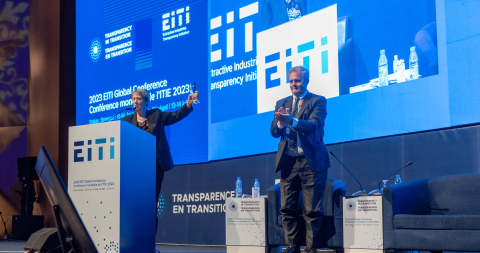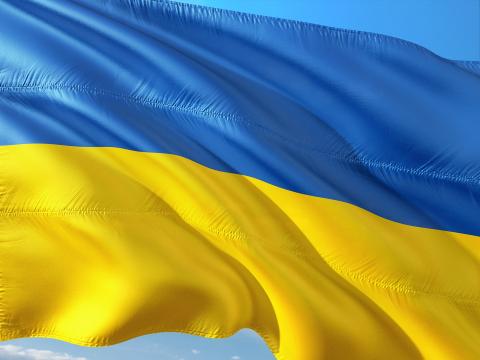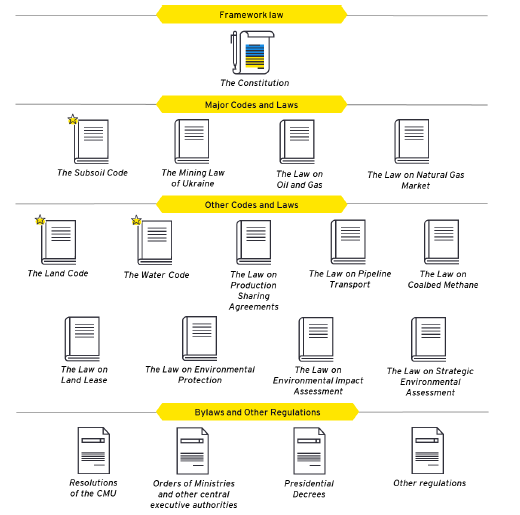
Ukraine
Overview and role of the EITI
While largely an agricultural economy, Ukraine is also a leading producer of iron, manganese and titanium ores. The country also produces oil, gas and coal as well as clays and sand.
Ukraine has used the EITI platform to increase the availability of extractives data and strengthen collaboration and dialogue between the central government, local governments, companies and local communities. It has used the process to address local concerns through dissemination and outreach campaigns. As active participants in the EITI process and main drivers for reform, civil society and development organisations such as DiXi Group and International Renaissance Foundation play a central in keeping the government accountable for the revenues received.
In February 2022, EITI Chair Helen Clark issued a statement following the Russian invasion of Ukraine.
Economic contribution of the extractive industries
- 11.2%
- to government revenues
- 4.9%
- to exports
- 4.5%
- to GDP
- 2.5%
- to employment
News, blogs, and more

Ukraine EITI celebrates a decade of extractives transparency

Los ganadores de los Premios de la Presidencia EITI 2023

Statement from the EITI Board Chair and Open Government Partnership Ambassador, Rt Hon. Helen Clark, on the situation in Ukraine

Ukraine makes strides in extractives sector oversight

Ukraine’s revolution against corruption and hidden ownership


Ukraine passes extractive industries transparency law based on best practice from EITI and EU

EITI as an ‘entry point’ for in-depth reforms in Ukraine
Innovations and policy reforms
- In September 2018, Verkhovna Rada (Ukraine’s Parliament) passed the widely-backed Law 2545-VIII ‘On ensuring transparency in extractive industries’, which sets out legal principles for the collection, disclosure and dissemination of data on Ukraine’s extractive industries.
- In January 2018, Ukraine enacted a law stipulating the allocations of extractive revenue shares to local government budgets in areas hosting extractive activities.
- In 2020, Ukraine developed a monitoring and evaluation system for Ukraine EITI.
- Since February 2021, the Ministry of Energy has been hosting a pilot online reporting and analysis platform, which was used to collect company reporting for the 2020 Ukraine EITI Report.
- In December 2021, draft Law “On amendments to some legislative acts of Ukraine to ensure transparency in the extractive industries” was passed by the parliament which is expected to increase transparency and accountability of the extractive sector through, for example, more comprehensive contract disclosure.
- In 2022, Ukraine began working on the establishment of local multi-stakeholder groups.
Extractive sector data
Production and exports
Revenue collection
Revenue distribution
Top paying companies
Extractive sector management
Tax and legal framework
Ukraine’s extractive sector is mainly governed by the Subsoil Code, the Mining Law of Ukraine, the laws “On Oil and Gas” and “On the Natural Gas Market”. More detailed overview of applicable legislation is provided below:

In September 2018, the government enacted Law 2545-VIII “On ensuring transparency in extractive industries” which harmonises Ukraine’s legislation with the EITI Standard and the European Union’s legislative acts with respect to increasing business transparency in extractive industries. It mandates the disclosure of payments made to the government at the project level, the ultimate beneficial owners of extractive companies, and other aspects of extractive agreements, such as social obligations. The law was further amended in December 2021.
Extractive companies mainly pay production royalties, VAT, corporate income tax and dividends.
License and contracts
In most cases, mining companies apply for special subsoil use permits (licenses), which are awarded through auction by the State Service of Geology and Mineral Resources. In 2020, licenses were sold at the electronic auctions on the basis of “Prozorro.Sales”. The government maintains an online license registry. In addition, license areas for subsoil use for each region can be viewed through an interactive map.
At the same time, alternative license allocation procedures (without auction) are applied to product sharing agreements and other specific cases defined in the legislation.
In 2019, the State Service of Geology and Subsoil began publishing license agreements (special permits) concluded from 2016 onwards. Some contracts are published on the Resource Contracts portal. The Law “On amendments to some legislative acts of Ukraine to ensure transparency in the extractive industries” that was passed in December 2021 is expected to strengthen contract transparency.
Beneficial ownership
In 2014, the Ukrainian government adopted legislation on beneficial ownership disclosures for all companies. In 2017, Ukraine established one of the world’s first beneficial ownership registers of legal entities under the Ministry of Justice. Since then, Ukraine has also established an asset register for government officials and a separate portal that provides information on politically exposed persons.
Since 2017, the government has been working with Open Ownership on high quality data production in order to integrate its national central register of beneficial ownership with the Open Ownership Register.
Revenue distribution
Most extractive taxes and payments are channelled to the state budget. However, some are allocated to regional, district or local governments’ budgets. The Budget Code of Ukraine determines the procedures for allocation of tax revenues between state and local budgets.
In January 2018, Ukraine enforced the Law on Amendments to the Budget Code of Ukraine Regarding the Inclusion of Rent Payment for the Use of Subsoil for the Extraction of Oil, Natural Gas and Gas. The law stipulates that 2% of the rent paid by companies be directed to regional budgets, 2% to district budgets and 1% to local government budgets at the place of location (production) of the relevant natural resources. The remaining 95% of rent payments are directed to the general fund of the state budget.
EITI implementation
Governance
Ukraine EITI (UAEITI) is administered by the Ukraine Multi-Stakeholder Group (MSG). The MSG is hosted by the Ministry of Energy and chaired the Minister of Energy.
Timeline
Government announces commitment to join the EITI
Multi-stakeholder group is formed
Candidature application is submitted
Application
Ukraine joined
2013 EITI Report published
Report
2014-2015 EITI Report published
Report
2016 EITI Report published
Report
Validation
Validation documents
2017 EITI Report published
Report
Validation
Validation documents
2019 EITI Report published
Report
2018 EITI Report published
Report
2020 EITI Report published
Report
2021 EITI Report published
Report
Adapted implementation is approved
Board decision
Validation
Ukraine was found to have made meaningful progress in implementing the 2016 EITI Standard in March 2021, following its second Validation. Ukraine fully addressed three of the eight corrective actions identified in its previous Validation. The next Validation is scheduled to commence in October 2023.
Scorecard
Key documents
Download the 2023 EITI Standard
Download Part 1 of the 2023 EITI Standard in Ukrainian.


